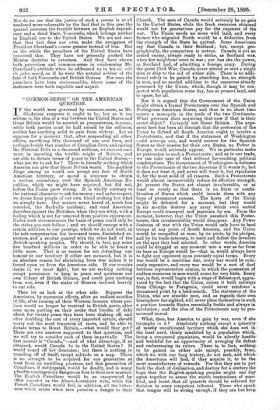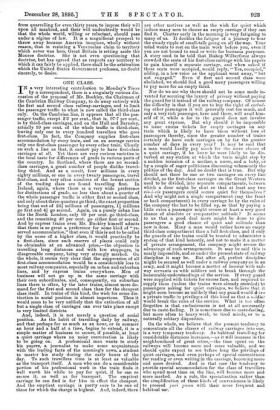" COMMON-SENSE " ON THE AMERICAN QUESTION.
IF the world were governed by common-sense, as Mr. Gladstone suggests it ought to be, but as it too seldom is, the idea of a war between the United States and Great Britain would be scouted as preposterous, because, while both parties must be half ruined by the collision, neither has anything solid to gain from victory. Let us suppose for a moment that, after suspending all other efforts, sacrificing fifty thousand of our own lives, and perhaps double that number of Canadian lives, and raising the National Debt to a thousand millions, we succeed once more in asserting the terrible might of Britain, and are able to dictate terms of peace to the United States,— what are we to ask for ? There is literally nothing which America can give that Great Britain wants. The maddest Jingo among us would not accept any foot of North American territory, or spend a sixpence to obtain a useless ascendency over the Spanish American Re- publics, which we might have acquired, but did not, before the Union grew strong. It is wholly contrary to the national character to ask for money ; and as for respect, we desire from people of our own blood nothing but what we already have. Our masses never heard of, much less resented, the Sackville incident ; and read American diatribes against the Britisher, when they are witty, with a feeling which is not far removed from positive enjoyment. Under such circumstances the basis of peace could only be the status quo ante bellum ; and we should emerge with a certain addition to our prestige, which we do not want, as the sole compensation for increased taxes, diminished re- sources, and a secular quarrel with the other half of the British-speaking peoples. We should, in fact, pay some five hundred millions in order to be able to boast a little more. That is no reason for not defending our honour or our territory if either are menaced, but it is an absolute reason for abstaining from war unless it is forced upon us from the American side. If our cousins desire it, we must fight ; but we are seeking nothing except permission to keep in peace and quietness our own Colony of British Guiana, and could gain nothing from war, even if the scales of Heaven inclined heavily to our side.
Then let us look at the other side. Suppose the Americans, by enormous efforts after an endless sacrifice of life, after ruining all their Western farmers whose pro- duce would no longer be received in British ports, after once more putting en their necks that burden of debt which for twenty years they have been shaking off, and after doubling the cost of every imported 'article, should weary out the most tenacious of races, and be able to dictate terms to Great Britain,—whit would they get ? There are two answers suggested to that question, and we will try to consider each of them impartially. The first answer is "Canada,"—and of what advantage, if so obtained, would Canada, be to the United States ? It weuld round off her dominion ; but there is nothing in rounding off of itself, except solitude on a map. There is no strength to be acquired for one generation at least from an unwilling province and this generation of Ceinadians, if subjugated, would be deadly, and in many plssible contingencies dangerous foes to their new masters. The English Canadians would be as exasperated by tlleir transfer as the Alsace-Lorrainers were while the French Canadians would feel, in addition, all the bitter- ness which arises when lien perceive a danger to their Church. The men of Canada would certainly be no gain to the United States, while the fresh resources obtained would not for generations pay for the expenses of the war. The Union needs no more wild land, and every farmer who migrated North would be a deduction from the strength of the State he quitted. Some Americans say that Canada is their Scotland; but, except geo- graphically, the comparison is untrue. Canada is not an armed enemy, always ready to strike, as Scotland was, when her neighbour went to war ; nor has she the power, as Scotland had, of admitting a foreign army. During the great Civil War, Canada never stirred or sent a single man or ship to the aid of either side. There is no addi- tional safety to be gained by absorbing her, no strength in men, and no needed addition to the resources already possessed by the Union, which, though it may be con- gested with population some day, has at present land, and to spare, for all.
But it is argued that the Government of the Union might obtain a formal Protectorate over the Spanish and Portuguese American States, and thus in no short time secure a monopoly in the trade of the two Continents. What prevents their acquiring that now if that is their secret object ? Certainly not Great Britain. The argu- ment here has been all through that the pretension of the Union to defend all South America ought to involve a Protectorate, and that if the statesmen of Washington could arrange one, and would answer for the Spanish States as they answer for their own States, no Power in Europe would seriously oppose. We in particular make no pretension to such a Protectorate; and as to our trade, we can take care of that without far-reaching political combinations. The Government of Washington is welcome to the Protectorate of the two Americas if it wants it ; but it does not want it, and never will want it, but repudiates it, for the most solid of all reasons. Such a Protectorate would almost inconceivably reduce its effective strength. At present the States are almost invulnerable, or at least so nearly so that there is no State or combi- bination of States which could invade them with any hope of permanent success. The hosts of the Union might be defeated for a moment, but they would in six months destroy any army which even united Europe could transport and maintain by sea. From the moment, however, that the Union assumed this Protec- torate, this invulnerability would disappear. Any Power desirous of war with the Union would only have to land troops at any point of South America, and the Union would be compelled at once, by its pride, by its pledges, and by its trade-interests, to meet and defeat the invaders on the spot they had selected. In other words, America could be dragged at any moment into a war as far from its base as Europe would be—that is, would always have to fight any opponent upon precisely equal terms. Every war would be a maritime war, every war would be ruin- ously expensive, and every war would be a sort of duel between representative armies, in which the poeseasion of endless resources in men would count for very little. Every war, in fact, would begin with a siege of Sebastopol, aggra- vated by the fact that the Union, unless it built railways from Chicago to Patagonia, could never reinforce a. threatened point by a land-march. The statesmen of the Union, who are sensible men, and as regards their own hemisphere far-sighted, will never place themselves in such a position towards States essentially feeble and always in revolution ; and the idea of the Protectorate may be pro- nounced unreal.
What, then, has America to gain by war, even if she triumphs in it ? Absolutely nothing except a quantity of mostly uncultivated territory which she does not in the least need, thinly inhabited by a population which, being a conquered population, would be silently hostile and watchful for an opportunity of avenging its defeat and embarrassing its rulers. There is, in fact, nothing to be gained on either side except, possibly, fame, which we, with our long history, do not seek, and which the Americans will find, if they acquire it, to be the most unsatisfactory of rewards. For this they are to put back the clock of civilisation, and destroy for a century the hope that the English-speaking peoples might one day agree together to arrest the sterile contentions of man- kind, and insist that all quarrels should be referred for decision to some competent tribunal. Those who speak that tongue will be strong enough, if they can but keep from quarrelling for even thirty years, to impose their will upon all mankind, and their will undoubtedly would be that the whole world, willing or reluctant, should pass under a regime of law. It is a magnificent prospect to throw away because America imagines, wholly without reason, that in resisting a Venezuelan claim to territory which never was hers. Great Britain is setting aside the Monroe doctrine. She is not even questioning that doctrine, but has agreed that as respects any territory to which it can fairly be applied, there shall be the arbitration which the -United States Government professes, no doubt sincerely, to desire.



































 Previous page
Previous page